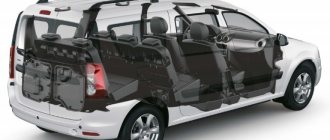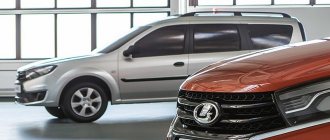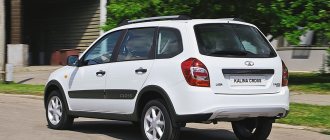ZR was the first to see new modifications of VAZ models Lada Kalina and Largus Cross, as well as Lada 4×4 Urban. “Within five minutes crossover” Lada Kalina Cross starts on September 1!
LADA > Kalina
LADA > 4×4
LADA > Largus
The magazine "Behind the Wheel" became the first publication to show the near future of the Lada brand.
The new products are so important for the plant that the presentation was personally conducted by Bo Andersson. The President, without hesitation, started with the Lada-Kalina Cross, without five minutes of crossover. We will follow his example: this car will appear first and at dealers - in September. It will be followed by the Lada 4×4 Urban - from October 1, and the Largus Cross - from November 1. So, about all three new products - in chronological order.
Lada Largus and Lada Largus Cross
We meet by clothes
There are not many external differences between the Largus. And only by looking closely, you can determine that the cross-version is slightly taller than the donor. It has unpainted bumpers with gray inserts on the lower part, as well as additional black trim on the wheel arches and sills. The regular Largus is equipped with 15-inch wheels, while the Crosses are equipped with 16-inch wheels. The only thing is that both have the same spare wheel, 15 inches, so in the first case the spare wheel is full-size, and in the second it is only in stock status. We have both cars in the maximum configuration: Largus Cross in the Luxe version, and the regular Largus - Luxe Prestige. Actually, the Prestige prefix only means cast wheels instead of stamped ones. But the cross modification has alloy wheels installed by default.
Salon Lada Largus and Lada Largus Cross
Pleasant differences
During the measurements, it turned out that the ground clearance of the Cross version is as much as 210 mm (under the protection of the engine crankcase). For a car that, according to its creators, should regularly drive off the asphalt, this is not bad. For a regular Largus, the ground clearance was 182 mm under a similar engine compartment shield. By the way, the manufacturer states that when fully loaded, including passengers in the last, third row of seats, the ground clearance will be at least 170 and 145 mm, respectively.
Our Cross turned out to be 35 kg heavier than the usual Largus. But one plastic body kit, which adds brutality and protects the car’s paintwork from scratches when driving over rough terrain, cannot weigh that much. Some of this 35 kg can be attributed to larger wheels. Perhaps there will be other technical solutions that will give the model additional weight?
We drive the cars onto lifts, remove the wheels and conduct a thorough inspection. Despite the apparent identity, differences were still found. Largus with the Cross prefix has original front struts. In particular, the spring cup is welded to the body 30 mm higher than that of the station wagon. This also ensures increased ground clearance. By the way, both models are equipped with Monroe struts from the factory. The rear gas-filled shock absorbers are also different. This is confirmed by identification numbers. The housings and shock absorber rods of the Largus Cross are longer, and the length of the rear suspension springs is also increased.
Shock absorbers Lada Largus Cross
As I was told at VAZ, when working with the suspension of the cross-version, the engineers were faced with the task of maintaining the suspension settings of the regular Largus as much as possible, and they succeeded. In terms of handling and level of driving comfort, the cars are very similar. At least, the average driver is unlikely to feel the difference in the behavior of the car on a good road. But when driving on a dirt road or broken asphalt, the Largus Cross slightly benefits in terms of smoothness due to the increased rolling radius of the wheel and wider tires.
Plus number 1. King of off-road
The Niva is an excellent option for inveterate fishermen and hunters, allowing you to drive along the highway and overcome moderate off-road conditions. The credit for this is the cross-country ability inherited from the 2121 VAZ. However, it’s definitely not worth competing with the progenitor: the engine remained the same, but the weight and wheelbase increased, which inevitably affected the off-road capabilities. And you can’t jack it up by the bumper like on a classic Niva.
However, in everyday life, not everyone will need off-road, but they often have to deal with winter, and besides, road workers are usually in no hurry to clear snow. In this case, the Chevrolet Niva will come in handy - just a little off the asphalt, the car will demonstrate itself in all its glory!
Shock absorbers Lada Largus Cross
Cross economics
It is unlikely that there will be conditions in which the geometric cross-country ability of vehicles will play a decisive role. Still, the difference in ground clearance is not so significant. More important, I think, are fuel consumption indicators. The “elevated” Largus spends 1.4 liters more for every hundred kilometers driven in the city and 0.8 liters more when driving on the highway compared to a station wagon without the Cross prefix. At least that's what the manufacturer says. But this is already a noticeable difference, especially over a long distance. What is it due to? Considering that the gear ratios of the cross-modification gearbox have not changed, we can only rely on aerodynamics, wheel size and an additional 35 kg of curb weight.
Minus No. 5. Vibrations and tremors
It is clear why, when working on the 21st Niva, the designers gave preference to a transmission that had a separate transfer case connected by a shaft to the gearbox - here the goals of unification with the “classics” from VAZ were pursued. The result turned out to be quite disastrous: Niva, vibrations and a howling transfer case have become an integral component, and the most frequently requested service for it is eliminating these vibrations and balancing the cardans.
Since initially a similar scheme began to be used on the Chevrolet Niva without any modifications, noise from the transfer case and indicators of its vibration load are most often mentioned as disadvantages of the model. The situation changed a little with the introduction of cardan shafts equipped with constant velocity joints instead. However, it was not possible to completely overcome the problem. Thus, the manifestation of vibration begins already at 90 km/h, and after accelerating to about “hundreds”, it can disappear completely.
Lada Largus and Lada Largus Cross
Summarize. If you want a little better ride and comfort, or if you need to regularly wade through fields and small bushes without damaging the body, take the Largus Cross. If every penny counts, a station wagon will do - it’s both cheaper and a little more economical to operate. By the way, Largus without the Cross prefix is also available with an eight-valve engine that can be fed with 92-octane gasoline. But the 102-horsepower sixteen-valve engine installed on the test cars is designed for 95-octane gasoline.
As for sales statistics, of the 26,460 Largus sold in 11 months of 2016, 50% of sales were made up of regular Largus. Another 30% of buyers preferred the Cross version, and the remaining 20% chose the van.
Plus number 2. Cheap components and easy maintenance
With a relatively simple design, the car has become more affordable to maintain: for scheduled maintenance at the dealer you will have to pay 9-15 thousand rubles, in a regular service, if the warranty issue is not very concerning, it will be about 20% less. Or you can do everything yourself: components and consumables make up about 50% of the cost of the entire service. Thus, the Niva will be an ideal option for those who are handy and know how to repair themselves, because an SUV in this regard is simple and convenient.
Photos of interior and exterior
Video test drive
During the test drive, it turned out that the driver in the Lifan Myway sits high, like in a crossover. The seats are more comfortable and the steering wheel turns easier and more comfortable. But in the Lada Largus there was more space in the 3rd row. General overview:
- Lifan Myway is a more modern and expensive car, comparable to crossovers.
- Lada Largus Cross is a more budget car (price/quality).
Let us remind you that according to calculations by the magazine “Behind the Wheel”, the cost of 1 km of Lada Largus is 4.18 rubles. According to owner reviews, this car is clearly worth the money.
Keywords: Lada Largus Cross
Seven for seven: test drive of the new Lada Largus Cross and five-year-old Chevrolet Orlando
Seven-seater station wagons are a class of car that until recently was almost unknown in our country, but has now firmly entered Russian automotive life. If you are thinking about buying one, what would you prefer: a brand new Largus Cross with zero mileage or a five-year-old Orlando that has already clocked up about fifty dollars?
Whatever your answer, don't rush into it. We brought these cars nose to nose and now we know that the issue is not as simple as it seems. Judge for yourself: in times of crisis, Largus remained the only seven-seater car with a price of “up to a million rubles,” and even now the cost of the most expensive version, even in the Cross version, is only 680,000 rubles. But by now the situation is not so uncontested: trouble has come to Largus, from where... it was worth waiting for it - from the used car market.
Three or four years ago, we wouldn’t have even thought of putting this Orlando on a par with the Largus: this car is at the “maximum speed”, and even then it cost 800,000 rubles, and after the fall of the ruble, luxury Orlandos went for far over a million . Now those rare new cars that are still in stock at dealers are offered at huge discounts and will cost only 800-900 thousand rubles. True, there are really very few of these left, and the import of new copies through gray dealers is much more expensive - the same “crisis” 1,300,000 - 1,500,000 rubles.
But if you want much cheaper, then there is always the option of finding on the secondary market such a vigorous example as ours: five years old, with far from critical mileage, without “adventures” and in complete luxury. And most importantly: its price will be the same as the new Largus Cross.
A little about technology
These cars are united not only by the body type and the number of seats, but also by the manufacturing “recipe”. Both cars are made on passenger car platforms, and on platforms that are reliable, well-proven and have now been worked out to the smallest detail.
But in this fact lies the difference between these cars. The “trolley” of Largus Cross is the new B0, which underlies Logan, Sandero, Duster... And Orlando has as a base the much more recent GM Delta II, the “firstborn” of which was the Chevrolet Cruze in 2008. Thus, Orlando’s “genes” are more progressive and belong to a higher class of cars. And you will definitely feel this difference.
Image
And of course, the cars are radically different from each other in appearance. Orlando is lower, wider and longer than his opponent. But with a larger overall length (4,652 mm versus 4,470 mm for the Largus), its wheelbase is already 145 mm more modest: only 2,760 mm for the Chevrolet and 2,905 mm for the Lada.
Thus, the forehead, as if slightly frowning, long, wide, low and having large overhangs Orlando is perceived as a pure “road car” against the backdrop of the “almost crossover” Largus Cross, the appearance of which has moved far away from the “progenitor” Logan, but is still discernible in the “cross-section” eye". And the main touch in this picture is, of course, ground clearance. The differences are visible to the naked eye, but in numbers they look like this: 140 mm for Orlando and 170 mm for Largus Cross.
Luggage space
The Orlando has a lifting back door, while the Largus Cross has two more practical swing doors that open 180 degrees if desired. In the seven-seat configuration, none of the cars has a trunk, but the Largus has a strip that remains between the bumper and the seat backs that is slightly wider than its opponent. But in Orlando, under this modest area there is a small “underfloor”, closed with a neat lid with a handle, and the third row seats themselves are not dismantled by unfastening two latches, like in Largus, but simply lie in the same plane with the floor, which is much more convenient.
In terms of cargo volumes, Largus is the leader: with the third row of seats raised, it guarantees you 135 liters of luggage space for a couple of small bags, but in Orlando they risk not fitting - there are only 89 liters. If you fold the third row of the Orlando, you get a trunk volume of a small sedan of 466 liters, and if you “fold” the second row, you get about the same thing as you would get when folding the seats in a not-so-outstanding “simply” station wagon – 1,499 liters Largus, with maximum cargo transformation, provides 2,350 liters of volume, which essentially gives you the use of a van.
Minus number 4. This is a Lada, not a Chevrolet
Unfortunately, the domestic auto industry has long been suffering from the quality of the components used. Despite the Chevrolet prefix, Niva remains the same Niva, because the joint venture uses domestic components, ranging from elements of the power unit, chassis and transmission, to body parts. That is why the problems of low quality shnivy remained relevant, moreover, design errors were added here. For example, because of one of these, the cooling expansion tank suffers - the valve built into its lid often refuses to work, which is why the tank body cracks, and if you are unlucky, you will have to change the radiator itself. It happens that some Shnivy owners changed the expansion tank several times. Another unpleasant moment is associated with the hydraulic timing chain tensioner - in desperation, many people replace it with an old type mechanical one.
The next problem with the Chevrolet Niva is related to the wheel bearings. The owners of the model believe that installing bearings from Iveco Daily will allow them to get rid of it. However, other components are also a weak point, among which it is worth noting the steering rods, silents, pump, pendulum-type lever and ball joints, and much of this changes repeatedly. Among the “little things” that are not worth talking about are all kinds of clamps and pipes.
It becomes clear that to ensure the proper condition of the car, constant attention is required. However, the situation cannot be called deplorable - many owners note reliability and endurance among the positive qualities of the Chevrolet Niva. At first glance, this may seem illogical, but Shniva “signals” that serious problems are expected in advance and allows you to safely get to the service house.
Which is better to choose: Lada Largus or Lada Largus Cross?
Car : Lada Largus. Asked by : Valeria Perediy. Question : I just can’t choose between the regular version of the Lada Largus and the cross version!
Hello. I was thinking about buying a car and decided to go with a domestic one, after all, at such prices it’s difficult to buy a new foreign car, and even if repairs are needed, ours is cheaper. I'm thinking about Lada Largus or Lada Largus Cross, I can't decide which is better?
What is the main difference? I will drive mainly around the city, sometimes on federal highways. Can you help me decide?
Since its appearance on the Russian automobile market, the Largus crossover has undergone some changes. It is also different from the usual Largus. True, these differences are minimal, but they still exist.
Minus number 1. Chevrolet Niva is not for the highways - the engine is not enough
80 hp motor Of course it makes itself felt. The Niva feels quite comfortable on flat roads up to 110 km/h with the ability to accelerate even to 140 km/h. However, in the latter case, the comfort of movement is immediately lost - the engine speed is in the red zone, nothing can be heard in the cabin from its roar, and the fuel “flies down the drain.” When making long hauls, it is better to stick to 90 km/h, which allows you to save gas and feel less tired. But approaching a slight rise, you realize that the engine begins to lack traction, even when switching to third. It’s the turn of second gear - here the engine begins to roar terribly, and the tachometer needle confidently occupies the red sector. It won’t be possible to change anything here, so the owners of the Chevy Niva think about out-of-town overtaking in advance, taking into account the car’s inability to increase its dynamics from 80 km/h. After all, the native environment of an SUV is primers.
Vehicle Specifications
The car, as before, has front-wheel drive. The crossover was built on the platform of the regular Largus. The ground clearance of the Largus Cross is 2.5 centimeters higher than the base car. It is about 17.5 centimeters when fully loaded. This ground clearance, of course, does not make the crossover an SUV, but it does provide certain advantages when driving on domestic roads.
The Largus Cross also has an improved suspension.
Namely: new shock absorbers and increased springs are installed at the front. Also, large wheel rims are used (R16). Thanks to the wheels, it was possible to increase the ground clearance by 5 mm. The rest of the lift is a modification of the suspension.
Engines
The crossover is equipped with a 1.6-liter sixteen-valve engine with a power of 102 hp. The regular Largus has an eight-valve engine with a power of 87 hp. Both cars come with a five-speed manual transmission.
Salon
The interiors of these two cars are no different from each other. Both cars have:
- Airbags (two, front).
- Air conditioner.
- EBD.
- ABS.
- Heated front seats.
- Leather steering wheel.
- Electric windows on all doors.
- Electrically adjustable rear view mirrors.
- Four speakers in the cabin.
- The driver's seat can be adjusted in height.
- Parktronic.
It is also worth noting that the stitching of the seats has changed. It was black and turned orange. Also, orange inserts appeared on the front panel and doors of the crossover.
Appearance
Lada Largus Cross
The crossover now has fog rails. The car can be produced in a five-seater and seven-seater body version. The Largus Cross has unpainted bumpers on the front and rear. The front bumper together with the radiator grille form a kind of mask, by which the crossover can be distinguished from a regular Largus. Also at the bottom there is a decorative trim on the bumper that imitates protection.
The biggest differences can be seen from the side. Here you can note the plastic lining on the crossover. You can also distinguish a car by its nameplate.
conclusions
Knowing the features of the Lada Largus and Lada Largus Cross, it will be easier for you to distinguish between these cars on the highway.
Design
After the restyling, the 2022 Lada Largus acquired a rather attractive appearance. The front part received the signature X-shaped radiator grille, but that's not all. The main lighting unit was unified with the second generation Renault Logan models.
It is worth noting that there have been virtually no changes at the rear. Among the main innovations, we can highlight the modified internal design of the rear lights. The tailgates open like flaps, providing a wide opening for loading. In addition, the height of the loading threshold remained at the same comfortable level.
The interior of the updated model has noticeably changed. This applies not only to its execution, but also to finishing materials. They have become more pleasant to the touch and much better quality. The front panel of the car has received a completely new look. Items such as power windows have been moved to the door cards.
On the center console there are controls for the climate control system, buttons for turning on the heated seats, depending on the configuration, the head unit of the standard audio system or a multimedia display. It is worth noting that in the restyled Lada Largus FL, a multifunction steering wheel is used for the first time for these models.
What does a “technical specialist” choose?
Those who want to buy a Lada Largus Cross do not fully understand how this car differs from a regular Largus. It should be said right away that the first model is built on the basis of the second and differs from it in increased cross-country ability, but it does not have all-wheel drive. The car simply has higher ground clearance and also provides some body protection. There is also a bumper trim at the front.
Engine
The 8-valve engine “guzzles gasoline in buckets.”
The difference between the cars is also the power units. The Cross is equipped with a 1.6-liter engine, while the Largus can have one of the 1.6-liter engines, which differ in the number of valves (16 and 8). Both models are equipped only with a five-speed manual transmission.
Clearance
In the regular version the ground clearance is 145 mm
Largus Cross has increased ground clearance by 2.5 centimeters. In Largus it is 17.5 cm. It was possible to increase the clearance by installing larger rear springs and modified front struts on the car. Also, larger diameter wheels are installed on the Cross. Because of these changes, the brake system in the Cross has undergone some restyling, as well as the steering.
Salon
Lada Largus Cross is offered immediately in the “Lux” configuration. Therefore, the car has:
- Electrically adjustable rear view mirrors.
- Air conditioner.
- Two airbags (front).
- ABS.
- Heated front seats.
- Leather steering wheel.
- Four speakers and audio system.
- Electric windows.
- Luggage rack.
- Parktronic.
- Adjustable driver's seat.
The upholstery is also different. Largus Cross has orange inserts on the front panel and doors. The stitching on the seats is also orange.
Modifications
Lada Largus Cross is available in only two modifications. The difference between them is the number of seats. It can be a five-seater car or a seven-seater.
Price
Lada Largus Cross is more expensive than its brother. The difference in price is insignificant.
New Lada Niva model 2015: photo, price, specifications, reviews, equipment
See the full review of the new Lada Niva 2015 model here: photos, prices, specifications, owner reviews, prices, as well as a video test drive!
The manufacturer's top management secretly reports that the new Lada Niva 4x4 (2121) will be significantly updated in 2014-2015. A full review of the car is not yet available, we can only guess.
So far, reliable news about Lada Niva 4x4. Machine dimensions – 3.74x1.68 (w)x1.64 (h). The ground clearance is incredibly high, as for domestic passenger cars - 23 cm. The average consumption of AI-95 gasoline is about 10 liters with a maximum speed of just over 140 km/h. A specialist can accelerate the car to the first hundred in 17 seconds.
Now the Lada Niva 2121 car is sold at a price of 365,000 rubles. This will be a car with a 1.7-liter engine and a manual transmission.
| clear the list | Lada LargusLada Largus 1.6(16V)Lada Largus 1.6(16V) vanLada Largus 1.6(8V)Lada Largus 1.6(8V) van | ||||||||
| Price | from 593,000 rub. | from 499900 rub. | |||||||
| Total information | Chevrolet Niva 1.7 × | Lada Largus 1.6(16V) × | |||||||
| Brand | Chevrolet | Lada | |||||||
| Model | Niva 1.7 | Largus 1.6(16V) | |||||||
| Year of issue | 2010 | 2012 | |||||||
| Number of doors/seats | 5/5 | 6/(5-7) | |||||||
| Body type | Station wagon | Station wagon | |||||||
| Curb weight, kg | 1350 | 1269 (1294) | |||||||
| Total weight, kg | 1860 | 1784 (1849) | |||||||
| Maximum speed, km/h | 140 | 165 (165) | |||||||
| Acceleration time from standstill to 100 km/h, s | 19 | 13.1 (13.5) | |||||||
| Minimum turning radius, m | 5.7 | 5.6 | |||||||
| Trunk volume, min/max, l | 320/650 | 135/560/2350 | |||||||
| Dimensions, mm | Chevrolet Niva 1.7 × | Lada Largus 1.6(16V) × | |||||||
| Length | 4048 | 4470 | |||||||
| Width | 1770 | 1750 | |||||||
| Height | — | 1636 | |||||||
| Wheelbase | — | 2905 | |||||||
| Front/rear track | 1450/1440 | 1469/1466 | |||||||
| Ground clearance | 200 | 145 | |||||||
| Engine | Chevrolet Niva 1.7 × | Lada Largus 1.6(16V) × | |||||||
| Type | gasoline injection | gasoline injection | |||||||
| Working volume, cubic cm | 1690 | 1598 | |||||||
| Compression ratio | 9.3 | 9.8 | |||||||
| Number and arrangement of cylinders | 4 cylinder, in-line | 4 cylinder, in-line | |||||||
| Cylinder diameter x piston stroke, mm | 82x80 | 79.5x80.5 | |||||||
| Number of valves | 16 | 16 | |||||||
| Power, hp/rpm | 80/5000 | 105/5750 | |||||||
| Maximum torque, Nm/rpm | 127.5/4000 | 148/3750 | |||||||
| Transmission | Chevrolet Niva 1.7 × | Lada Largus 1.6(16V) × | |||||||
| Gearbox type | 5-speed manual | 5-speed manual | |||||||
| type of drive | Permanent all-wheel drive | Front-wheel drive | |||||||
| Suspension | Chevrolet Niva 1.7 × | Lada Largus 1.6(16V) × | |||||||
| Front wheels | Independent double wishbone suspension | shock absorbers, wishbones, anti-roll bar, coil springs | |||||||
| Rear wheels | Dependent 5-link suspension, coil springs | trailing arms connected by a transverse beam, coil springs, telescopic shock absorbers | |||||||
| Tire size | 205/70/15 | 185/65 R15 | |||||||
| Disk options | 5×139.7 ET46 d70.6 | 4×100 ET50 d60.1 | |||||||
| Brakes | Chevrolet Niva 1.7 × | Lada Largus 1.6(16V) × | |||||||
| Front | Disk | Ventilated disc | |||||||
| Rear | Drums | Drums | |||||||
| Fuel consumption according to standards 93/116/EEC, l/100 km | Chevrolet Niva 1.7 × | Lada Largus 1.6(16V) × | |||||||
| Urban cycle | 14.1 | 11.5 (11.5) | |||||||
| Country cycle | 8.6 | 7.5 (7.5) | |||||||
| Mixed cycle | 10.8 | 9 (9) | |||||||
| Fuel | 92 | 95 | |||||||
| Fuel tank capacity, l | 58 | 50 | |||||||
| clear the list | Chevrolet NivaChevrolet Niva 1.7 | Lada LargusLada Largus 1.6(16V)Lada Largus 1.6(16V) vanLada Largus 1.6(8V)Lada Largus 1.6(8V) van | |||||||
| Engine | 1.6 l 8-cl., 5MT, 84 hp | 1.6 l 16-cl., 5MT, 105 hp | 1.6 l 8-cl., 5MT, 84 hp | 1.6 l 16-cl., 5MT, 105 hp | |||||
| Execution | Standard | Norm | Lux | Norm | Lux | ||||
| Options package | A00 | A00 | A18 | A2K | A2D | A18 | A2U | A2K | A2D |
| Option code | KS015-40-A00 | KS015-41-A00 | KS015-41-A18 | KS0Y5-42-A2K | KS0Y5-42-A2D | RS015-41-A18 | RS015-41-A2U | RS0Y5-42-A2K | RS0Y5-42-A2D |
| price, rub. | 479 000 | 503 000 | 525 000 | 565 200 | 571 700 | 549 000 | 558 500 | 589 200 | 595 700 |
| Safety | |||||||||
| Driver airbag | |||||||||
| Front passenger airbag with deactivation function | |||||||||
| Front seat belts with force limiter | |||||||||
| Rear seat headrests | |||||||||
| ISOFIX child seat anchors | |||||||||
| Child lock rear doors | |||||||||
| Immobilizer | |||||||||
| Fog lights | |||||||||
| Anti-lock brake system (ABS) | |||||||||
| Interior | |||||||||
| On-board computer | |||||||||
| Second row split seat (1/3 and 2/3 layout) | |||||||||
| Third row of seats | |||||||||
| Third row split backrest (1/2 layout) | |||||||||
| Fabric upholstery | |||||||||
| Leather-wrapped steering wheel | |||||||||
| Passenger sun visor mirror | |||||||||
| Luggage rack on the roof lining | |||||||||
| Trunk curtain shelf | |||||||||
| Glove compartment lighting | |||||||||
| Luggage compartment lighting | |||||||||
| Driver's tools: jack, combination wheel wrench, towing eye | |||||||||
| Comfort | |||||||||
| Power steering | |||||||||
| Height-adjustable steering column | |||||||||
| Adjusting the height of the front seat belts | |||||||||
| Driver's seat with height adjustment and lumbar support | |||||||||
| Tinted windows | |||||||||
| central locking | |||||||||
| Central locking with remote control | |||||||||
| Power windows for front doors | |||||||||
| Power windows for rear doors | |||||||||
| Heated front seats | |||||||||
| Electric drive and heated exterior mirrors | |||||||||
| Air conditioner | |||||||||
| Audio preparation | |||||||||
| Audio system (FM, CD, MP3, AUX, USB, Bluetooth, Hands free), antenna | |||||||||
| 2 speakers | |||||||||
| 4 speakers | |||||||||
| Exterior | |||||||||
| Bumpers in body color | |||||||||
| Exterior mirrors in body color | |||||||||
| Door handles in body color | |||||||||
| Side door moldings | |||||||||
| Railings | |||||||||
| Wheels stamped 15″ | |||||||||
| Cast wheels 15″ | |||||||||
| Spare stamped welded wheel full size 15″ | |||||||||
LADA Niva 4×4 3 doors 5 doors
| Engine | 1.7 l 8-cl., 5MT, 83 hp | |||
| Execution | Standard | Lux | Standard | |
| Options package | 010 | 010 | 017 | 025 |
| Option code | 21214-40-010 | 21214-42-010 | 21214-44-017 | 21310-40-025 |
| price, rub. | 405 000 | 416 700 | 426 000 | 441 500 |
The Lada Niva car, the new 2014 model, has a luggage compartment volume of 265 liters. It can be increased due to the rear row seats to a fantastic 585 liters.
What does the future hold for the car? Of course, improvements and modifications. But this will not happen until 2022. Speaking of today, the Lada 4x4 has undergone some changes in 2014. But they are insignificant. One gets the impression that forces and resources are being prepared for a leap forward. A new noise reduction system, an automatic transmission and several body modification options, including a sedan, are already expected.











